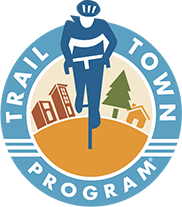On October 27th, the Trail Town Program held its annual Fall summit at the Fairfield Inn and Suites in Cumberland, Maryland. Just over forty business owners, community members, and volunteers from several of the Trail Towns came to the summit. After the introductions Courtney Mahronich, one of the Student Conservation (SCA) Trail Town Outreach Corps Fellows, gave an update on the Trail Town Certified Network (TTCN). Overall, there are twenty-one new TTCN members with seven of those members being based in Homestead, Pennsylvania.
 There were two main issues that the Trail Towns along the GAP are experiencing in regards to their TTCN efforts to be as sustainable and trail friendly as possible. The first one is an ongoing effort with recycling. Many of the towns do not have a local recycling center. Some suggestions that were made were to “pair up” trips. That is when you take your recycling into a center where there may be a grocery store available. Another suggestion was for the towns located close to Uniontown, such as Ohiopyle, to take their recycling to Uniontown. The other issue brought up during the TTCN update was getting employees in high-turnover jobs, such as restaurants, educated about the trail and its amenities. The Trail Town Program is looking into developing a mini lesson that business owners can use to educate their employees quickly and effectively.
There were two main issues that the Trail Towns along the GAP are experiencing in regards to their TTCN efforts to be as sustainable and trail friendly as possible. The first one is an ongoing effort with recycling. Many of the towns do not have a local recycling center. Some suggestions that were made were to “pair up” trips. That is when you take your recycling into a center where there may be a grocery store available. Another suggestion was for the towns located close to Uniontown, such as Ohiopyle, to take their recycling to Uniontown. The other issue brought up during the TTCN update was getting employees in high-turnover jobs, such as restaurants, educated about the trail and its amenities. The Trail Town Program is looking into developing a mini lesson that business owners can use to educate their employees quickly and effectively.
Next there was a panel on local food and how it could be used in businesses and communities. John Golden, a business professor from Slippery Rock University and managing director of the Sustainable Enterprise Accelerator, discussed about how using local food is part of the experience of tourism. Millions of people come to the trail because they like the experience of it and Golden stated food should be a part of that moment too. Emily Schmidlapp, the Fresh Access Coordinator for Just Harvest, agreed but also added that local food can serve the community too, especially with programs such as getting farmers’ markets EBT/Credit/Debit friendly.
After lunch, there was a panel on off season activities. One suggestion made here was to tap into other outdoor activities, such as ice fishing or ice climbing. Another suggestion was to buy a few pair of snowshoes to keep at bed and breakfasts and offer them for guests who would like to use the trail in the winter. Overall, the summit entailed a variety of great conversations led to make the GAP trail the best that it can be.

